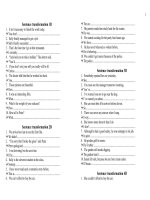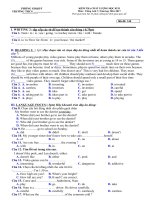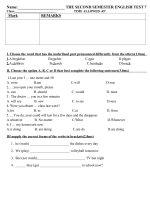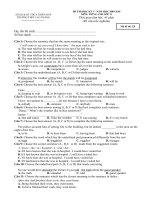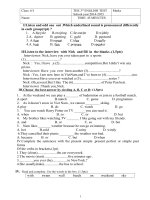ĐÁP ÁN THAM KHẢO VSTEP SPEAKING
Bạn đang xem bản rút gọn của tài liệu. Xem và tải ngay bản đầy đủ của tài liệu tại đây (503.08 KB, 20 trang )
ĐÁP ÁN THAM KHẢO SPEAKING PART I – B1 B2
PART I: SOCIAL INTERACTION
Nhiệm vụ: Thí sinh được cho 2 chủ đề với 3 câu hỏi cho mỗi chủ đề, thí sinh trả lời
nhanh khi câu hỏi xuất hiện. Tổng thời gian là 3’
Các bài mẫu sau chỉ trình bày mang tính chất gợi ý cho thí sinh các ý tưởng,
khuyến khích các bạn thêm 1-2 ý riêng của mình để câu trả lời có nhiều thơng tin
hơn, một câu trả lời có độ dài hồn hảo sẽ từ 3-4 câu hoặc trong khoảng 20-25s.
Tuy nhiên nếu các bạn “bí” thì cũng hoàn toàn trả lời như hướng dẫn, tuy câu trả
lời ngắn nhưng vẫn có nhưng thơng tin cơ bản vừa đủ, cấu trúc khơng lặp nhiều và
từ vựng có trọng tâm, đảm bảo vẫn đạt điểm từ B1 trở lên.
DANH SÁCH CHỦ ĐỀ
A. “Neighbors” (hàng xóm) ...................................................................................................................... 2
B. “Houses and apartments” (nhà cửa) .................................................................................................... 3
C. “Hometown” (quê quán) ..................................................................................................................... 4
D. “Friends” (bạn bè) ............................................................................................................................... 5
E. “Reading” (đọc sách, báo) ................................................................................................................... 6
F. “Studies” (học hành) ............................................................................................................................ 6
G. “Walking” (đi bộ)................................................................................................................................. 7
H. “Parks” (cơng viên) .............................................................................................................................. 9
I. “Games” (trị chơi).............................................................................................................................. 10
K. “Transport” (phương tiện đi lại)......................................................................................................... 11
L. “Work” (công việc) ............................................................................................................................. 12
M. “Cooking” (nấu ăn) ........................................................................................................................... 13
A. “Neighbors” (hàng xóm)
1. How well do you know your next-door neighbors? (bạn có quen biết những
người hàng xóm cạnh nhà bạn không)
I know my neighbors quite well. They're really nice people, and I always stop to
talk whenever I see them. I think it's important to get on well with the people who
live next door.
- get on with sb: hợp với ai đó
- next door: bên cạnh nhà
2. How often do you see them? (bạn có thường xuyên gặp họ không)
I see my neighbors at least a few times a week. We usually see each other when
we're leaving for work in the morning or coming home in the evening.
3. What problems do people sometimes have with their neighbors? (theo bạn mọi
người thường xảy ra vấn đề gì với hàng xóm của họ)
I think the most common problem is probably noise. It's difficult to live next to
people who have a dog that barks at night, or who play loud music or have too
many parties.
- bark: sủa
B. “Houses and apartments” (nhà cửa)
1. Do you live in a house or an apartment? (bạn sống ở nhà hay căn hộ)
I live in a semi-detached house with three bedrooms in a suburb of Manchester.
I've lived there for just over a year.
- semi-detached house: nhà chung tường, chung vách với nhà khác
- suburb: ngoại ô
2. Which is your favourite room in your home? (bạn thích phịng nào nhất)
I don't really have a favourite room. But if I had to choose, I'd say the living room
because that's where I go to sit and relax.
3. Would you change anything about your home? (Bạn có muốn thay đổi gì trong
nhà của bạn)
Yes, I've been meaning to redecorate it since I moved in last year. It needs a new
kitchen, so that's what I'd change first.
- mean to do sth: có ý muốn làm gì đó
- redecorate: trang trí lại
4. Would you like to move to a different home in the future? (Bạn có muốn chuyển
đến một ngôi nhà khác trong tương lai) Yes, I'd definitely move again at some
point if I could afford to. I'd like to live in the
countryside, or maybe in a different city or country.
- point: nơi, điểm
- afford: đủ khả năng về tài chính
C. “Hometown” (quê quán)
1. Where are you from? (bạn đến từ đâu)
I'm from Manchester, which is a city in the north-west of England.
- north-west: vùng tây bắc
2. Do you like your home town? (bạn có thích q bạn khơng)
Yes, I like living in Manchester because it's where most of my friends live, and
because there are plenty of things to do there. The only thing I don't like is the
weather.
- plenty of: vô cùng nhiều
3. Would you prefer to live somewhere else? (bạn có muốn sống ở một nơi khác)
For the moment I'm happy living here, but at some point, I'd like to live in a
country with a warmer climate, and I'd like to live near a beach!
- point: điểm, nét
- climate: khí hậu
4. Do you think your home town is a good place for young people? (bạn có nghĩ
rằng quê bạn là một nơi phù hợp cho người trẻ)
Yes, Danang has lots of things for young people, such as sports facilities, music
and cinemas.
- sports facilities: cơng trình, khu thể thao
D. “Friends” (bạn bè)
1. Are your friends mostly your age or different ages? (bạn bè của bạn đa số cùng
độ tuổi hay khác tuổi bạn)
Most of my friends are about the same age as me because we met at school or
university. I've got one or two friends who are older or younger that I met through
work.
2. Do you usually see your friends during the week or at weekends? (Bạn có
thường xuyên gặp bạn bè trong tuần hay cuối tuần không)
I tend to meet up with my friends at weekends because everyone's too busy during
the week.
- meet up: sắp xếp gặp (phr v)
3. The last time you saw your friends, what did you do together? (Lần gần nhất bạn
gặp gỡ bạn bè thì các bạn làm gì với nhau)
It was one of my friends' birthday last weekend. Six of us went out for a meal to
celebrate.
4. In what ways are your friends important to you? (bạn bè quan trọng với bạn như
thế nào)
I think it's important to have friends that you can talk to and share experiences
with. My friends make me laugh, but I know I can also rely on them whenever I
need help or support.
- rely on: dựa vào (phr v)
E. “Reading” (đọc sách, báo)
1. Do you like reading? (bạn có thích đọc khơng)
Yes, I like reading a lot. I read all sorts of things, including novels, newspapers,
magazines,and online articles.
2. Do you usually read for leisure or for work purposes? (bạn thường đọc cho để
giải trí hay là phục vụ công việc)
Well, I have to do a certain amount of reading as part of my job, but I probably
read more for enjoyment. I pick up a newspaper most days, and I usually have a
book on the go.
- enjoyment: sự vui vẻ
- pick up: lấy thông tin, học tập, đọc (phr v)
- on the go: bận rộn cả ngày, luôn tay luôn chân, tất bật (phr v)
3. What was your favorite book or story when you were a child? (quyển sách hay
truyện bạn thích đọc khi cịn nhỏ là gì)
The first book that I remember really enjoying was “Toi thay hoa vang tren bai co
xanh” It only took me a few days to read because I liked it so much that I couldn't
put it down.
- couldn't put it down: không thể rời mắt (phr v)
4. Do you think it's important that children read regularly? (bạn có nghĩ trẻ em cần
đọc sách thường xuyên)
Definitely. I think reading is possibly the most important skill that children learn.
The ability to read opens the door to all aspects of education.
- opens the door to sth: mang đến những cơ hội để có được (idiom) à Our course is
the door to success in English (khóa học này sẽ mang đến cơ hội thành công trong
việc học Tiếng Anh)
- aspect: khía cạnh
F. “Studies” (học hành)
1. Do you like studying? (bạn có thích học tập, nghiên cứu các thứ không)
Yes, I like studying because it's the best way to gain a deeper insight into any
subject. I like reading, learning from others, and trying to understand difficult
concepts.
- gain: có được, đạt được
- insight: sự hiểu biết, thấu hiểu, nắm vững cái gì đó
- concept: khái niệm, nội dung
2. Do you prefer to study alone or with others? (bạn thích học một mình hay với
người khác)
I prefer to study alone because I need to be able to concentrate fully. Other people
are a distraction.
- concentrate fully: tập trung hoàn toàn
- distraction: điều gây xao nhãng
3. Where do you prefer to go when you need to study? (khi bạn cần học, bạn thích
đến nơi đâu) I like to find a quiet corner in my local library; being in an old
building and surrounded by books seems to help me to focus on my work.
- surround: xung quanh
- focus on: tập trung
4. How do you feel if someone disturbs you when you are studying? (bạn cảm thấy
thế nào nếu có ai làm phiền lúc đang học)
It frustrates me because it breaks my concentration. I prefer to avoid distractions
by going somewhere where nobody will interrupt me.
- frustrate: làm ai đó mệt mỏi, bực bội, thất vọng
- concentration: sự tập trung
- avoid distractions: tránh các thứ làm ta xao nhãng
- interrupt: ngắt lời, làm gián đoạn
G. “Walking” (đi bộ)
1. Do you like walking? (bạn có thích đi bộ không)
I'm really into going on long walks in the countryside, but I don't mind walking
when I'm in a town or city, for example when I'm sightseeing in a new place.
- don’t mind: không phiền (+Ving)
- sightsee: ngắm cảnh
2. Do you think walking is important? (bạn có nghĩ việc đi bộ là quan trọng không)
Yes, I think it's important to be active, and walking is the most basic physical
activity that we can do.
- physical activity: hoạt động thể chất
3. Do you think walking in the countryside is better than walking in the city? (bạn
có thích đi bộ ở vùng q hay ở thành phố)
Personally, no. As I said before, I like walking in the city, especially if it's
somewhere with a lot of history like London or Paris.
4. What could be done to improve the experience of walking in cities? (theo bạn
thành phố phải có những cải thiện gì để mọi người thích đi bộ hơn)
I suppose the main issues are space and safety. Pavements need to be wide enough
to accommodate lots of pedestrians, and we need safe places to cross the street.
- safety: sự an toàn
- pavement: vỉa hè
- accommodate: cung cấp đủ không gian cho …
- pedestrian: người đi bộ
H. “Parks” (cơng viên)
1. Do you like parks? (bạn có thích cơng viên khơng)
- Yes, I like parks because they're great places to relax or go for a walk. I think
every city needs some green space where people can escape from the crowds.
- green space: không gian xanh
- escape from the crowds: tránh những nơi đông đúc
2. How often do you visit parks? (bạn có thường xun đi đến cơng viên)
There's a park very close to where I live, so I probably go there once or twice a
week if the weather's nice.
3. Why are parks an important part of many towns and cities? (tại sao công viên lại
là nơi quan trọng của các thành phố)
Parks are like an oasis where people get away from the hustle and bustle of city
life. They are where people go to have lunch, to take some exercise, or to forget
about work for a while.
- oasis: ốc đảo
- get away from the hustle and bustle: thoát khỏi sự ồn ào náo nhiệt
4. What do you think could be done to make parks better? (theo bạn các cơng viên
phải có những cải thiện gì để mọi người thích đến hơn)
The parks in big cities are already really good in my opinion. If I think about the
famous parks in London, Paris or New York, I can't imagine what I would do to
improve them.
I. “Games” (trò chơi)
1. What games are popular in your country? (trị chơi gì là phổ biến ở nước bạn)
Well, if we can consider sports as games, then football is definitely the most
popular game in my country, but we also love board games like chess.
- board games: trò chơi tương tác với nhau trực tiếp thường diễn ra trên một mặt
bàn như cờ, bài, …
2. Do you play any games? (bạn có chơi trị chơi gì khơng)
Not regularly these days. I play the occasional game of tennis with my brother-inlaw, and I’ve recently played a bowling game on the computer with my nephew. I
wasn't very good at it.
3. How do people learn to play games in your country? (mọi người học chơi các trò
chơi như thế nào)
I think children teach each other to play games. I remember a friend at primary
school teaching me to play chess, for example.
4. Do you think it’s important for people to play games? (theo bạn việc mọi người
chơi các trị chơi có quan trọng khơng)
Yes, it's really important, especially for children. I think research has shown that
play can improve brain development, intelligence, creativity, and the ability to
cooperate with others.
- brain development: sự phát triển trí tuệ
- intelligence: trí thơng minh
- creativity: khả năng sáng tạo
- to cooperate: khả năng tương tác, phối hợp
K. “Transport” (phương tiện đi lại)
1. What form of transport do you prefer to use? (bạn thích sử dụng phương tiện
nào)
I prefer to travel by car because it means that I have my own space. Also, the buses
and trains in my city are usually overcrowded; my car is much more comfortable.
- own space: không gian riêng
- overcrowded: quá đông đúc
2. How much time do you spend travelling on a normal day? (bạn thường dành bao
nhiêu thời gian di chuyển mỗi ngày)
I probably spend about an hour and a half travelling to and from work. I travel
during the rush hours, so there is quite a lot of traffic.
- rush hours: giờ cao điểm
3. Do you ever have problems with transport? (bạn có từng gặp vấn đề gì với
phương tiện đi lại)
Yes, as I said, I get stuck in traffic on my way to and from work. I used to get
annoyed by traffic jams, but now I'm used to them.
- get stuck in traffic: bị kẹt xe
- annoyed: bực bội
- traffic jams: tình trạng tắc đường
L. “Work” (công việc)
1. Do you work or are you a student? (bạn đang đi làm hay là sinh viên)
I'm a qualified doctor, but at the moment I'm studying English so that I can work in
an international hospital in the future.
- qualified doctor: bác sĩ có chun mơn giỏi
2. Do you enjoy your job? (bạn có thích cơng việc của mình khơng)
Yes, I really enjoy my job. Ever since I was a child, I have always wanted to be a
doctor. I've always wanted to be able to help people.
3. What's the best thing about your job? (điều bạn thích nhất ở công việc của bạn)
The best thing about my job is that I can make a difference in people's lives. It's a
great feeling to see someone recover after an illness because my colleagues and I
were able to help.
- make a difference: thay đổi
- recover: phục hồi
- colleague: đồng nghiệp
4. Do you prefer working alone or with others? (bạn thích làm việc một mình hay
với người khác)
In a hospital you have to work as part of a team. I've got used to working with
others, and I think you can achieve a lot more as a team than you would alone.
- achieve: đạt được
M. “Cooking” (nấu ăn)
1. Do you like cooking? (bạn có thích nấu ăn khơng)
Sometimes, I like preparing a special meal for family or friends who visit, but
everyday cooking is a bit boring; it's something that has to be done, but it's not
really fun.
2. Who did the cooking in your family when you were a child? (ai là người nấu ăn
trong gia đình bạn khi bạn cịn nhỏ)
My mother almost always did the cooking when I was young. I don't think she
trusted my father to make a nice meal.
3. Do you think that it's important to know how to cook well? (theo bạn có cần
thiết phải biết nấu ăn ngon hay không)
I'm not sure whether it's important to cook well, but I do think that everyone should
know the basics. It definitely isn't healthy to rely on pre-prepared meals or fast
food.
- basics: những món cơ bản
- pre-prepared meals: bữa ăn chuẩn bị sẵn
4. Do you think that children should be taught cookery at school? (theo bạn trẻ em
có nên được dạy nấu ăn ở trường không)
Yes, that's probably a good idea. If all children knew how to cook a few basic,
healthy meals, that would surely be a good thing.
N. “Laughing” (cười)
1. What kinds of thing make you laugh? (điều gì thường làm bạn cười)
I laugh most when I'm with friends talking about funny things that have happened
to us. I also like watching comedians and comedy films.
- comedian: diễn viên hài
2. Do you like making other people laugh? (bạn có thích làm người khác cười)
Yes, it's a nice feeling when you can make someone laugh because you can see that
you've made them happy. It's great to share a funny moment with someone.
3. Do you think it's important for people to laugh? (theo bạn việc cười đùa có quan
trọng khơng)
Yes, of course. It's important to see the funny side of things; humor helps us not to
take life too seriously. I think that laughter is good for our health.
- humor: sự hài hước
O. “Clothes” (quần áo)
1. Are clothes and clothing fashions important to you? (áo quần và thời trang có
quan trọng với bạn không)
No, clothes and fashions are not really important to me. I tend to wear clothes that
are comfortable and practical rather than fashionable.
- practical: tiện lợi
- fashionable: thời trang
2. What different clothes do you wear for different situations? (bạn thường mang
các loại áo quần gì trong từng dịp khác nhau)
Well, I have to dress quite formally for work, so I wear shirts and trousers. At
home I prefer to wear jeans and a T-shirt, and on special occasions I might wear a
suit.
- formally: một cách trang trọng
- suit: vét
3. Do you wear different styles of clothes now compared to 10 years ago? (kiểu áo
quần của bạn mang bây giờ có khác 10 năm trước không)
No, not really, because I don't follow fashion. I think I have dressed in a similar
way for the last 10 years.
- dress: mang đồ
4. Do you think the clothes we wear say something about who we are?
Yes, they probably do. Some people are really careful about what they wear
because they want to be seen as stylish. Other people wear clothes that show
wealth or status, such as clothes by famous designers.
- stylish: hợp thời
- wealth: sự giàu có
- status: địa vị
P. “Musical instruments” (nhạc cụ)
1. Which musical instrument do you like listening to most? (bạn thích chơi nhạc cụ
nào nhất)
My favorite musical instrument to listen to is the guitar. I like the fact that there are
different types of guitar, like classical, acoustic and electric. I love the variety of
sounds a guitar can make.
2. Have you ever learned to play a musical instrument? (bạn đã từng học chơi nhạc
cụ bao giờ chưa)
I took some guitar lessons when I was younger and still have a guitar at home. I
don't play it much nowadays. I wish I had more time to practice.
3. Do you think children should learn to play an instrument at school? (bạn có nghĩ
trẻ em nên học chơi nhạc cụ ở trường)
Yes, I think it's a great skill and it's really enjoyable to be able to play a musical
instrument.
All children should be given this opportunity.
- enjoyable: vui vẻ
4. How easy would it be to learn to play an instrument without a teacher? (theo bạn
có dễ học nhạc cụ mà khơng cần giáo viên không)
It would probably be more difficult without a teacher. You need someone to show
you what to do and correct your mistakes. You need a lot of discipline to teach
yourself.
- correct your mistakes: sửa lỗi
- discipline: sự kỉ luật
Q. “Shopping” (mua sắm)
1. Who does most of the shopping in your household? (ai thường mua đồ nhiều
nhất trong nhà bạn)
There isn't one person who does most of the shopping. I'd say it's a shared
responsibility because we tend to go shopping together as a family.
2. What kind of shopping do you like doing? (bạn thường mua những đồ gì)
I quite like shopping for presents for people's birthdays or for Christmas. My
favorite type of shop would have to be a bookshop.
3. Is shopping a popular activity in your country? (hoạt động mua sắm có phổ biến
ở nước bạn khơng)
Yes, it's very popular. Saturday is the busiest shopping day, and lots of people treat
shopping as a kind of leisure activity, rather than something practical.
- treat: xem
4. What types of shops do teenagers like best in your country? (các bạn teen
thường thích mua những thứ gì)
I'm not an expert on teenage behavior, but I guess they like buying clothes, music,
gadgets... that kind of thing.
R. “Sports” (thể thao)
1. What sports or physical activities do you regularly do? (bạn thường tham gia
những hoạt động thể thao nào)
Unfortunately, I don't have time to do any sports or physical activities because of
my work commitments. I'd like to find more time for regular exercise.
- work commitments: tính chất bắt buộc của công việc
2. Which sport or game would you like to be good at? (môn thể thao hay trò chơi
nào bạn muốn chơi tốt)
I'd like to be good at tennis. It must be great to be able to hit the ball as hard as you
can and watch it land exactly where you wanted it to.
- hit the ball: đánh bóng
3. Do you prefer watching or playing sports? (bạn thích xem hay chơi thể thao)
I don't watch much sport on TV and I'm not a big sports fan, so I think I would
probably enjoy doing sports more than watching them.
- sports fan: người thích chơi thể thao
4. Do you think children should be encouraged to do more sport? (bạn có nghĩ trẻ
em nên được khuyến khích chơi thể thao nhiều hơn)
Yes, I think that sport is really important for children. Sports and games teach
children to play together and try their best.
S. “Pet” (thú cưng)
1. What is your favorite pet? (bạn thích thú cưng gì)
Well, speaking of pet, I like best is dogs, especially Buli dogs. Dogs are believed to
be the most royal pet. Besides, dogs are very intelligent so they can understand our
mood.
- royal: trung thành
2. Do you have a pet at home? (bạn có ni thú cưng khơng)
Of course, I have a Goden one at home. I have had him for almost one year and I
call him Bin. There are many wrinkles in his face, which makes him look so cute.
It seems to me that he can understand my thoughts and gestures. I love him so
much.
- gestures: cử chỉ
3. What are the benefits of keeping pets? (lợi ích của việc nuôi thú cưng)
As far as I concerned, they may be our good friends. We will have quality time
with them by walking them to the park or gossiping with them. And, well, we can
also make more friends with those who share the same interest of raising pets with
us.
- quality time: thời gian vui vẻ
- gossip: trò chuyện
T. “Fruits” (trái cây)
1. Do you like fruits? (bạn có thích trái cây)
Sure! I enjoy eating fruits so much. All kinds of fruits are delicious and, well,
eating a lot of fruits provides us with necessary vitamins which are very good for
our health.
2. What is your favorite fruits? (bạn thích trái cây nào)
Well, I would say that I’m quite passionate about all types of tropical fruits,
especially oranges. This is simply because orange is cheap to buy and easy to eat. I
can buy oranges in almost any markets or supermarkets, even though from some
vendors in streets. It’s so tasty!
- tropical: nhiệt đới
- vendors: người bán hàng
3. How important is fruit to your health? (trái cây tốt cho sức khỏe như thế nào)
Certainly, fruits are considered as a natural source of vitamins. They are not only
good for our physical health but they are also beneficial to our beauty, especially
our skin.
- natural source of vitamins: nguồn vitamin tự nhiên
